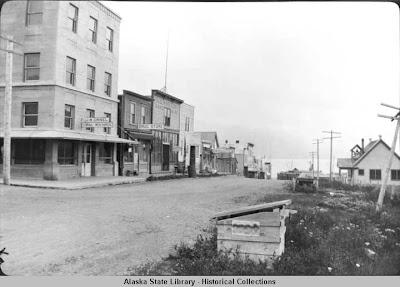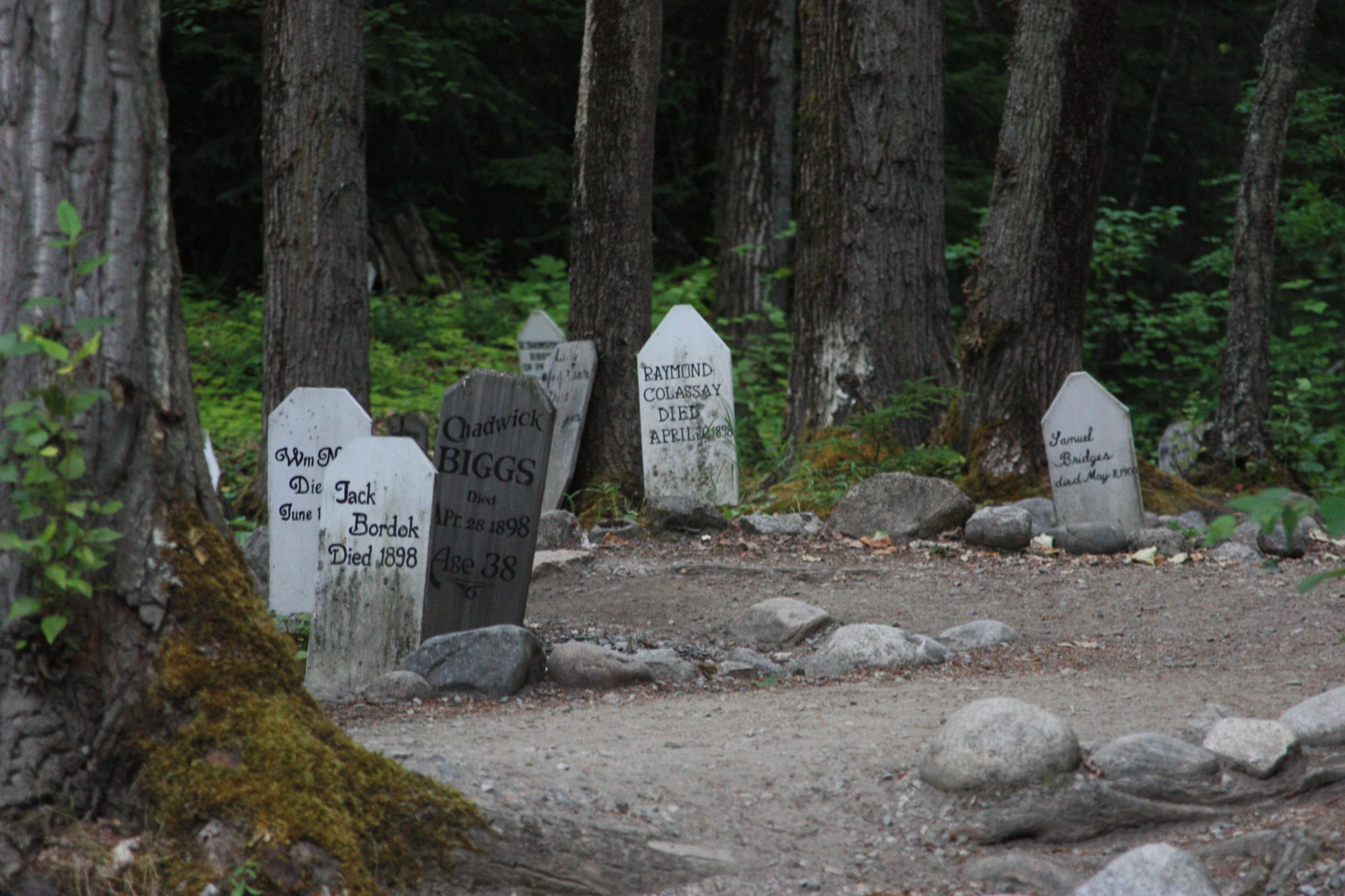 A nice early photo of Harriet Pullen on her wagon. Imagine being picked up from your cruise ship by this conveyance and transported to your hotel on 7th.
A nice early photo of Harriet Pullen on her wagon. Imagine being picked up from your cruise ship by this conveyance and transported to your hotel on 7th.
Joseph Chisel

Joe Chisel was a member of the Arctic Brotherhood in 1905 and ran a gambling house and later a General Drug Store in Haines. Seen above is the store he ran with his brother in the 1920’s in Haines. Joe was born on this day, June 6, 1868 in Bavaria Germany
and came to the U.S. with his mother, Frances, in 1869 when he was nine months old. He came to Alaska during the 1897 Gold Rush and changed the spelling of his name to Chisel from Schisel.
His brother Albert was born in Wisconsin (see earlier blog on his untimely death in Haines over a dog.) Joseph died in 1946 in Portland.
family website;
Skagway Hostel Ghost

Skagway’s Alaskan Sojourn Hostel, which is situated in a local gold-rush-era house, recently had a guest report that he felt that his room had been visited by a benign ghost in the night. Although the identity of this ghost is well-known to the owners of the house, and ghost’s descendants in town, I am withholding the name out of respect for the family. Suffice it to say that it was a young man who tragically drowned at a young age in the early 1930s. The present owner of the house says that several years ago, she also saw the ghost calmly descending the stairs, and vanishing before it reached the last step.
Source: Local interview; http://www.alaskansojourn.net
Alexander Grey
Alexander Grey, known as Sandy, lived in New Westminster, British Columbia but was on his way to Atlin when he checked into the St. James Hotel. The St. James Hotel building is still standing and is directly behind the Hardware Store on 4th. Sandy Grey was born in 1858 in Ontario but had moved to B.C. by 1880. At the age of 41, he died of heart failure on this day, May 26, 1899 in Skagway. His brother George was in New Westminster but it was decided to bury him here in the Gold Rush Cemetery. The headstone, obviously replaced is wrong on two things, the spelling of his name and his age, both of which are from the census and death records. I don’t know what the little saying on the bottom says, I will have to go up and check it out.
Does his ghost still haunt the St. James? Ask one of the hardware employees.
Skagway death/coroners inquest record; 1880 BC census.
Walter T. Chestnut

Walter was born in 1873 in Fredericton, New Brunswick. Although he was an accountant, he and his brother came west and were working on the ship Islander in 1898. Walter contracted pneumonia while onboard and had to disembark in Skagway where he died in the Hotel Rosalie, on this day, April 8, 1898. His remains were taken to Victoria where he was buried.
The Hotel Rosalie was located on the corner of Broadway and Bond (4th). It was a one room hotel where patrons curled up in corners. The building changed hands pretty soon after the Gold Rush and became Brownell’s Hardware Store. Then in 1903 Mr. John Anderson bought it and transformed it into the Pantheon Saloon. Charles Walker, who had done such a grand job of decorating the AB Hall, was hired to do the same with the saloon. Today you can see some of his artwork (restored by the Park Service) on the front of the Pantheon. In past years the Pantheon was leased to jewelers as part of the Klondike Gold Rush NHP’s leaseback program, but like many other businesses on Broadway this summer, it has gone vacant and will be used for meetings/training again this summer.
Several years ago, I worked in this building and I can say I never saw or felt the ghost of poor Mr. Chestnut, perhaps he just wanted out of here. Seen above is the building – labeled Hardware Store. The photo was taken at midnight in June by Barley.
Skagway Death Record; Victoria Daily Colonist April 15, 1898.
Joseph W. Nees
Herman Grimm

Herman was born in 1865 in Denmark. He ran the Seattle Saloon on the northwest corner of 6th and State Street known as “the Gentleman’s Saloon”. Grimm stood for no nonsense. “No women, no gambling, no trouble,” was his motto. On January 22, 1904, when Army deserter Jeff Halloway, “a drunken roysterer (sic)” and “flourishing a revolver,” caused some trouble at the Seattle, Herman personally ushered him out the back door. He also owned the Pack Train Bar.
Grimm built a house in 1898 at the northwest corner of 6th Avenue and Alaska (or Holly and Ivy on original street maps). The present owner has been remodeling and meticulously restoring it over the past 9 years. It features a “widow’s walk,” hipped roof, bay windows, gable roof dormers, and barge boards over the porch. Past additions to the rear and a rock fireplace have been removed, and the house was raised. Property records show that the property sold for $150 in 1898. In 1902 he had a garden, 50 feet by 100 feet where he raised strawberries, cabbage, cauliflower, kale, carrots, celery, parsley, peas, beans, lettuce, spinach, rhubarb and potatoes. He also had cherry and apple trees. The garden was one of the federal government’s experimental stations. Seen above is his neighbor’s garden with the Grimm house in the back.
Herman Grimm died on this day, March 30, 1928 and is buried in the Pioneer Cemetery.
1900 census;1902 directory;1905 directory; 1915 directory;1910 census; Skagway death record. U.S. Congressional report of the Office of Experiment Stations, issue 4425, 1902.
Barfight
Max Gutfeldt
Max Gutfeldt ran the Vienna bakery from about 1905 through 1920 in what is now the Historic Skagway Inn. He was born in 1868 in Germany and his was one of the few Jewish families in Skagway. After his first wife Emma died in Tacoma, Washington in 1901, he remarried in 1903 and moved his family to Skagway.
Max was a City Councilman in 1913 and signed a letter to the Governor of Alaska in May 1915 requesting a road. Ethyl and sons Louis and Arnold worked in Skagway. Arnold was later in the U.S. Signal Corps and Louis signed up for the World War one draft. Both died after spending much of their careers working for the railroad.
Max died on January 8, 1923 in Tacoma.
1905 and 1915 directories, 1910 and 1920 and 1929 censuses; Newspaper record NPS files; Jewish Genealogical Society of Washington State online; Washington state records.
Mary Ellen/Elizabeth Higgins Hitchcock

Mary Higgins was born on this day March 1, 1849 in Baltimore Maryland or Virginia or Brooklyn, New York. In any event she was from a very wealthy family and married U.S. Navy Commander Roswell D. Hitchcock in 1871. He died in 1892 leaving her a bored and wealthy widow.
She was an eccentric writer who came to Alaska three times with her friend Edith Van Buren (grand-neice of President Van Buren), the last in 1899. Later that year she wrote a book entitled “Two Women in the Klondike” of her adventures with Edith and their two great dane dogs, Ivan and Queen, a dozen pigeons, two canaries and a parrot. I have read this account of their hardships (having to wait all morning for the warm water for their manicures) and having to discipline the insubordinate “servants” that they encountered. It would be funny except that I’m sure that their fellow travelers were not amused.
When they finally got to Skagway on their way south, they stayed at Brannick’s Hotel that had a 4-poster bed with spring mattresses, sheets and pillowcases.
They went to an oyster bar for dinner (beer, ten cents) and took the City of Topeka steamer south the next day.
She had her portrait done with Ivan, seen above. She felt she had endured great hardships, and told stories of her adventures back in Amityville, New York where she died in 1920 at the age of 71.
nytimes article 8/22/1899; victorian-cinema.net; Two Women in the Klondike by Hitchcock.



